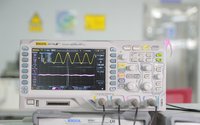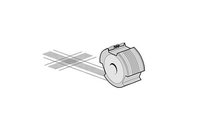What is sinusoidal vibration test? Relevant standards for sinusoidal vibration detection
Date:2021-07-27 16:12:00 Views:5097
Sinusoidal vibration test is a mechanical environment test method of mechanical movement, which simulates the sinusoidal vibration and its influence that products can withstand in the process of transportation, storage and use, so as to verify the adaptability and reliability of products. In aviation, aerospace, vehicle, ship, automobile, electrical and electronic industries, this is a common and basic method, which can be implemented in general vibration laboratory. GB/T2423. 10-2008 / iec60068-2-6:1995 environmental testing of electrical and electronic products Part 2: Test methods, test FC and guidelines: vibration (sinusoidal) this part gives a standard test method and process to determine the ability of components, equipment and other products to withstand sinusoidal vibration with specified severity.
Purpose of test:Determine the mechanical weakness and characteristic reduction of the sample. These data are combined with relevant specifications to determine whether the sample can be accepted. In some cases, this test method can be used to demonstrate the mechanical structure integrity and dynamic characteristics of the sample. The level of components can also be divided according to the ability to withstand different severe registration of this test.
Sinusoidal vibration test is divided into: sinusoidal sweep frequency test (sweep frequency durability and constant frequency durability), dangerous frequency measurement (resonance search).
The test conditions of sinusoidal vibration test are determined by frequency range, vibration amplitude and duration of durability test.
Physical quantity of vibration: frequency; Acceleration g or M / S2; Amplitude {single amplitude (0-P), full amplitude (P-P)}; Test direction; Test time; Sweep rate - Oct / min, Dec / min (logarithm), Hz / S (linear); Number of sweep cycles.
Test conditions and selection:For sinusoidal vibration, both military standards and civil (commercial) standards are widely used at home and abroad. The difference is that the purpose and object of application are different. In the U.S. military standard and national military standard of microelectronic device test methods and procedures, sinusoidal vibration is used to assess the strength, fatigue and noise of devices. In the U.S. military standard and national military standard of electronic and electrical component test methods, except for aerospace products, sinusoidal vibration is used to assess the environmental adaptability and structural integrity, Sinusoidal vibration shall be used for vibration response inspection and environmental adaptability and structural integrity assessment of ship equipment in American Standard (810) and national military standard (150) of military equipment environmental test method. Sinusoidal vibration shall also be used for sound inspection and resonance frequency, mode and vibration mode analysis in American Standard (1540) and national military standard (1027) required by satellite environmental test. Sinusoidal vibration is more widely used in IEC and national standards.
_20210727161201_886.jpg)
Sinusoidal vibration detection standard (CNAs approved):
Environmental testing of electric and electronic products Part 2: Test methods Test FC: vibration (sinusoidal) GB / T 2423.10-2008
Environmental tests for electric and electronic products Part 2: Test methods Test FC: vibration (sinusoidal) IEC 60068-2-6:2007
Frequency range of durability test: 10hz-55hz, 10-150hz, 10-500hz, 55-500hz, etc.
Duration of durability test: generally, 1min, 2min, 5min, 10min, 20min, 50min and 100min in each direction
The constant frequency durability test is conducted on the frequency of the searched resonance point. The general time is 10min, 30min, 90min, etc.
The general inspection standards for vibration test are as follows:
Environmental testing of electric and electronic products - Part 2: Test methods, test FC and guidelines: vibration (sinusoidal) GB / T 2423.10-2008 / IEC 60068-2-6:1995
Environmental testing of electric and electronic products Part 2: Test methods Test Fh: broadband random vibration (digital control) and guidelines GB / T 2423.56-2006 / IEC 60068-2-64:1993
Environmental testing of electric and electronic products Part 2: Test methods Test fi: vibration mixed mode GB / T 2423.58-2008 / IEC 60068-2-80:2005
Packaging - Basic tests for transport packages - Part 2: temperature and humidity conditioning treatment (GB / T 4857.2-2005 / ISO 2233:2000)
Basic technical conditions for automotive electrical equipment QC / T 413-2002
General specification for military computer GJB 322a-1998
General specification for military communication equipment GJB 367a - 2001
General specification for military electronic test equipment gjb3947a-2009
Rail transit rolling stock electronic devices GB / T 25119-2010 / IEC 60571:2006
General specification for electronic measuring instruments GB / T 6587-2012
Test methods and procedures for microelectronic devices GJB 548b-2005
Test methods for electronic and electrical components GJB 360b-2009
Military equipment laboratory environmental test methods Part 16: vibration test GJB 150.16a-2009
Environmental stress screening method for electronic products GJB 1032-1990
Environmental test and vibration test of ship electronic equipment GJB 4.7-1983
Vibration test method for railway ground signal products TB / T 2846-1997
Packaging - Basic tests for transport packages - Part 23: random vibration test method (GB / T 4857.23-2012)
Impact and vibration test of rail transit rolling stock equipment GB / t21563-2008 / IE 61373:1999




 Weixin Service
Weixin Service

 DouYin
DouYin
 KuaiShou
KuaiShou





















